TODAY’S READING FROM THE OLD TESTAMENT- 1 KINGS 20:1-21:29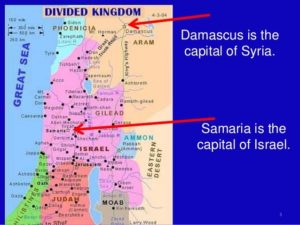
Ahab, of the house of Omri, is still on the throne of Israel (the northern kingdom) in the capital city of Samaria. He is still worshiping Baal yet on occasion humbling himself before Yahweh (1 Kings 21:29) and heeding the counsel of Yahweh’s prophets (1 Kings 20:13-15). God is merciful in postponing judgment upon the nation of Israel even though He has already directed Elijah to anoint Hazael, a future king of Syria, and had him waiting in the wings to be an instrument of judgment, bringing future attacks on Israel.
Ben-Haddad, king of Aram (Syria) in Damascus, musters his entire vast army and 32 kings with plans to attack Samaria, the capital of the northern kingdom (Israel). Without inquiring of the Lord, King Ahab gives in to King Ben-Haddad’s demands for his silver, gold, wives and children. Not satisfied with this first concession alone, King Ben-Haddad demands to search Ahab’s palace in Samaria and take everything Ahab values.
The elders and the people of Israel admonish Ahab not to give in to Ben-hadad’s demands. When Ahab refuses to give the Arameans access to the palace, Ben-hadad is furious and threatens to obliterate Samaria.
Ahab responds to Ben-hadad’s threat to level Israel’s capital city saying, “Tell him: One who puts on armor should not boast like one who takes it off!” (1 Kings 20:11). In other words, “Don’t count your chickens before they’re hatched!”
Ben-hadad and the kings were drinking in their tents when they receive the message of Ahab’s refusal. Ben-hadad orders his men to prepare to attack Samaria.
Meanwhile an unnamed prophet comes to Ahab prophesying that the Lord would give the Israelites victory over Ben-hadad’s vast army. God is showing great mercy to evil king Ahab and is doing so to vindicate His Name. “And then you will know that I am the Lord.” The young officers of the provincial commanders strike down their Aramean opponents.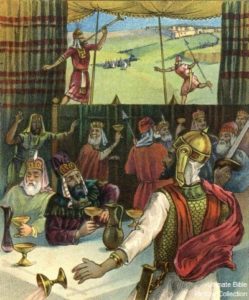
There is a rematch in the following spring. Ben-hadad has been advised to recover from their former losses, restore the size of their army, and attack on the plain (or in the valleys). They had a limited view of the God of Israel, perceiving him to be only ‘a god of the hills’ and not the valleys.
Sometimes we too can have a limited view of God, seeing him only as the god of the mountaintop experiences and not knowing him during the prolonged trials and everyday life in the valley. God is ALL-MIGHTY and EVERYWHERE PRESENT. He is the God of the valleys and plains, as well as the mountaintops.
Once again, an unnamed prophet has a message for Ahab:
1 Kings 20:28 28 Then a man of God came near and spoke to the king of Israel and said, “Thus says the LORD, ‘Because the Arameans have said, “The LORD is a god of the mountains, but He is not a god of the valleys,” therefore I will give all this great multitude into your hand, and you shall know that I am the LORD.'”
The Lord once again gives Israel the ability to inflict 100,000 casualties among the Aramean foot soldiers in a day. 27,000 were victims of a wall collapse in the city of Aphek. The Aramean officials plead for mercy wearing sackcloth and ashes. An appeal is made to spare King Ben-hadad’s life. King Ahab concedes and makes a treaty with Ben-hadad.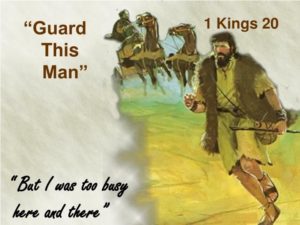
The word of the Lord comes through another unnamed prophet who rebukes Ahab for his disobedience by use of a parable:
1 Kings 20:39-40 39 As the king passed by, he cried to the king and said, “Your servant went out into the midst of the battle; and behold, a man turned aside and brought a man to me and said, ‘Guard this man; if for any reason he is missing, then your life shall be for his life, or else you shall pay a talent of silver.’ 40 “While your servant was busy here and there, he was gone.” And the king of Israel said to him, “So shall your judgment be; you yourself have decided it.“
Other interests caused him to compromise his obedience to the Lord.
- Campbell Morgan writes,
“God had created for the king (Ahab) an opportunity to return to Himself. Ben-hadad, drunken, profligate, despotic, came in the pride of his arms against Samaria. By the prophets Jehovah spoke to Ahab, who acting under divine direction, gained complete victory over his enemy. Then followed failure in the very hour of triumph. He made a covenant with the man whom God had devoted to destruction. He had one thing to do by the command of God, and while he did a hundred things, he neglected the one.
That was the meaning of the parable. What a revelation this is of a perpetual reason and method of failure! We are given some one responsibility by God, some central definite thing to do. We start to do it with all good intention; and then other things, not necessarily wrong in themselves, come in our way. We get “busy here and there”, doing many things, and neglect the one central thing. That is failure of the most definite kind. If a man is called to preach the Word and becomes busy over a hundred things other than that which is his central work and so loses the opportunity to preach, his failure is complete. That which is our God-appointed work, we must do. If we fail in that, the fact that we have been ‘busy here and there’, doing all sorts of other things, is of no avail. Concentration upon the work entrusted to us is a solemn obligation.” – “Searchlights in the Word” p. 100
Ahab is told that he will be held accountable for his sin.
Ahab’s selfishness is once again apparent when he insists on annexing his palatial property with Naboth’s vineyard in order to construct his vegetable garden. He offers a land-swap to Naboth who refuses, citing that it was his family’s inheritance. Naboth’s refusal causes Ahab to sulk and refuse to eat.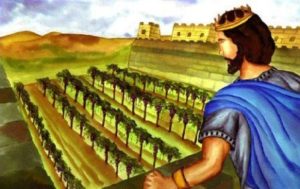
Ahab’s wife, Jezebel, offers to take the matter into her hands. She writes letters pretending that they are in Ahab’s handwriting and then makes false charges of blasphemy against Naboth, arranging to have him publicly accused by false witnesses and stoned to death. After Jezebel’s plot to murder Naboth is executed, she tells Ahab to get up and take possession of Naboth’s vineyard.
We see Elisha in action as he comes to reprimand Ahab for his sin and prophecy his death and the end of the house of Omri. He also predicts the death of Jezebel, saying ‘dogs will devour Jezebel by the wall of Jezreel’.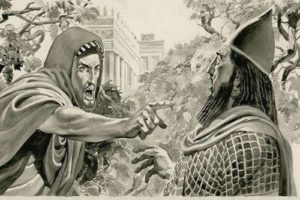
Ahab, hearing these words, humbles himself, putting on sackcloth and fasting. Because Ahab humbles himself, God postpones bringing judgment upon Ahab, but affirms that he will bring it upon Ahab’s house in the days of his son.” (1 Kings 21:29)
TODAY’S READING FROM THE NEW TESTAMENT – ACTS 12:24-13:15. 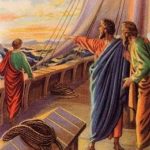
Chapter 12 ends with the report of the gospel spreading. Barnabas and Saul finish their mission and return to Jerusalem. True church growth is the result of the word of God doing its work.
Acts 12:24 24 But the word of the Lord continued to grow and to be multiplied.
In the first half of the Book of Acts we see that the church at Jerusalem is the hub of the Spirit’s activity, issuing forth missionaries as believers were scattered by the persecution of Stephen. The Apostle Peter is the main figure.
In the second half we see the church at Antioch as the hub of missionary activity. It was the third largest city in the Roman empire after Rome in Italy and Alexandria in Egypt. Because so many ancient cities were called ‘Antioch’, this city, located about 300 miles north of Jerusalem, is on the Orontes River and was often called ‘Antioch on the Orontes’ or ‘Antioch of Syria’.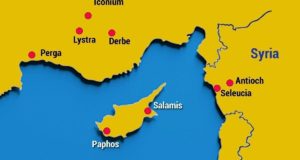
The church at Antioch is an exemplary church in that they had a notable leadership team. There was a diversity of cultures and gifts. The men had different ethnic and socio-economic backgrounds. Barnabas was from Cyprus. Simeon (African) of Niger could speak to the blacks; Saul a well-educated Jew from southern Turkey could debate in the synagogues; Manaen could deal with the wealthy politicians (he was a friend of Herod Antipas); Lucius (Cyrene, modern day Libya) could minister to the immigrants. Some had the gift of prophecy (forth-telling more than fore-telling, from what we know) and some were gifted teachers. All were gifted in the ministry of the Word of God.
They had a God-given vision for missions. They were willing to obey the Spirit and give up their best leaders to spearhead evangelism, discipleship and church-planting in new territories. This is the first church that we see deliberately implementing a missions strategy.
What we learn here is that the Holy Spirit is very involved in the ministry of the local church. In the Book of Acts, we see the Holy Spirit’s role in appointing overseers (the term is used interchangeably with pastors and elders- Acts 20:28). We see the Holy Spirit’s role in evangelism, discipleship and mission.
The Holy Spirit did not tell the other leaders where Saul and Barnabas should go on their mission. The Holy Spirit told the leaders to separate Saul and Barnabas for the work He had called them to. This fact emphasizes both the importance of our personal accountability to the Holy Spirit’s instruction and the role of His appointed leadership in the local church to provide spiritual watchcare over the ministries and missions of their flock.
Because Barnabas was from Cyprus, it is likely that he had sufficient knowledge of the island to make it a good choice for their first mission. They had a divine appointment with the proconsul, Sergius Paulus at Paphos. Satan brought hindrance through a false prophet named, Bar-Jesus, Elymas, (the name means ‘sorcerer’). God’s power was demonstrated when Paul, influenced by the Holy Spirit, called Elymas out as ‘a child of the devil and enemy of everything that is right’ (Acts 13:10). Elymas was then struck by the Holy Spirit with temporary blindness. It is not what we normally think of as being the signs and wonders that engender faith, but it fostered a reverence for God, and as a result, Sergius Paulus believed the gospel! We get an idea of the message that Paul preached by what is recorded at Barnabas and Paul’s next stop.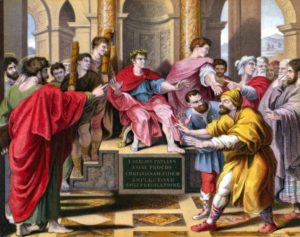
Paul and Barnabas move on to Pisidian Antioch where God gives them an opportunity to testify of Christ in the local synagogue.
TODAY’S READING FROM THE BOOK OF PSALMS- PSALM 137:1-9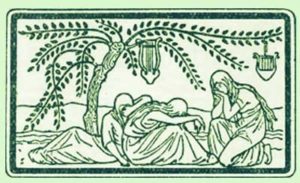
There are two parts to this Psalm. The first part recalls God’s promises to be fulfilled in Jerusalem and the heartache of not being there (Psalm 137:1-6). The second half is the cry for God’s justice to fall on God’s enemies (v. 7-9).
The Psalmist expresses the need to be rightly related to the promises of God by being in the place where God commands His blessing. Figuratively he refers to being ‘in Jerusalem’ or ‘in the temple’ but in reality, it is about being ‘in Christ’. It is ‘in Christ’ that the covenant promises ultimately find their fulfillment.
How can we sing the Lord’s song of God’s covenant promises when we are not positioned where the covenant promises are to be fulfilled?
The Psalmist recognizes that judgment must fall on God’s enemies, but anticipates that it will be the Lord’s doing, anticipating the work of the cross. (If God’s judgment falls on His enemies anywhere apart from the cross, there can be no mercy).
TODAY’S READING FROM THE BOOK OF PROVERBS- PROVERBS 17:16
Proverbs 17:16 16 Why is there a price in the hand of a fool to buy wisdom, when he has no sense?
The Proverb discloses that if a fool went out shopping for wisdom, he would not recognize it if he saw it.
PRAY FOR THE NATIONS- INDIA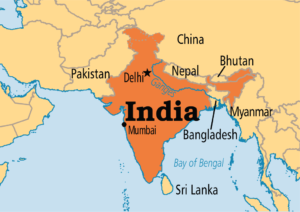
India
Republic of India
Asia
Geography
Area: 3,166,000 sq. km
A further 121,000 sq. km of Kashmir, a contested area, is administered by Pakistan and China. Geographically and politically, India dominates South Asia and the Indian Ocean. There are 28 Union States and 7 Union Territories.
Population: 1,214,464,312 Annual Growth: 1.44%
Capital: Delhi
Urbanites: 30.1%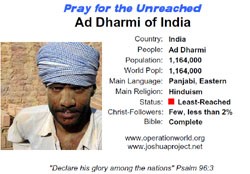
HDI Rank: 134 of 182 (UN Human Development Reports 2009)
Peoples
Peoples: 2,533 (88% unreached) All peoples
Unreached Peoples Prayer Card
Official language: Constitutionally there are 22 official languages. The official language is Hindi (spoken by 40% of the population). English is a subsidiary official language Languages: 456 All languages
Religion
Largest Religion: Hinduism
|
Religion |
|
Pop % |
Ann Gr |
|
71,011,000 |
5.84 |
3.7 |
|
|
26,290,283 |
2.2 |
3.9 |
|
|
Hinduism |
902,711,323 |
74.33 |
|
Challenges for Prayer
Training Christian workers is an important need that is immediately urgent and essential in the long term. The life and health of the Church depend on the proper development of pastors, teachers, evangelists and missionaries. In churches, poor discipling and lack of teaching and modelling of biblical life and leadership are problems. India’s strong philosophical tradition and religious, cultural and ethnic diversity make adequate training crucial, but most workers are sent out with very little specific preparation for their ministry context. There are over 100,000 full-time workers in India; about half are pastoring local churches. There is, on average, one trained pastor for every six congregations. Pray for:
- a) Degree-level seminaries, which now number over 100; praise God for the multiplication of these! There are three accrediting agencies – Senate of Serampore College, Asia Theological Association and Indian Institute of Missiology. Many of these seminaries are theologically evangelical. The number of seminary graduates opting for missionary service, however, is decreasing. Pray for an increasing stream of well-trained, spiritually passionate workers with a burden for effective ministry in their nation.
- b) Bible schools number over 1,000 and are doubling in number every 10 years. Evangelical institutions are full. Bible schools are moving from merely teaching theology to giving practical skills for ministry, particularly for church planting.
- c) Training centers for indigenous workers play a significant role. Set up largely for church planters, these number over 100 (FMPB, IEM, OM, ICRM, GEMS, Missions India, Seva Bharat, Operation Agape, others). GFA has set up 55 such centers, with 7,000 currently receiving training.
- d) New, creative ways for multiplying leaders must be developed. The need is greater than what residential institutions can produce, and 90% of pastors lack access to adequate theological training. Also, residential institutions must move beyond a Western maintenance model that has minimal impact on the non-Christian majority. Thankfully, there is a growing stream of non-formal education that is looking at how to address this challenge.
- e) Training Christians– those outside of the traditional roles of pastor, evangelist and missionary – to be effective witnesses and ministers is essential. The Indian Church must learn to have a greater impact in the workplace, especially in the newer areas of IT, business and such.
- f) The house/cell church movement is rapidly spreading in many parts of the country, with estimates of up to 100,000 such gatherings. These movements are proving culturally appropriate, affordable, biblically authentic and very effective.
- g) The South Asia Bible Commentary will be a boon to potentially hundreds of thousands of pastors, lay leaders and students.
PRAYER: Father, there are so many take-away lessons from these readings. Keep us from getting caught up with busy-ness going here and there and neglecting to do what You have called us to do! Thank You for the ministry of the good news of Who You are and what You have done in the perfect redeeming work of Your Son. We thank You that You have given Christ to be head over all things to the church, which is His body, and for the government of the Holy Spirit coordinating every member! We want to see every local church functioning like the church at Antioch where every member responds to the direction of the Holy Spirit. Thank You for positioning us ‘in Christ Jesus’ who has fulfilled all Your righteous demands on our behalf and has won for us the covenant blessings! We don’t need to hang up our harps, we need to bring them out and play them joyfully, loudly, symphonically!
We thank You for appointing leaders in the church to provide spiritual watchcare and safeguard the ministry of the Word.
We pray for the people of India. We pray that their physical needs be met, and even more importantly, their need to hear Your Word and drink from the well of salvation! We ask this in the Name of our Lord, Savior, and Life-Source Jesus Christ! Amen!
Pastor David
